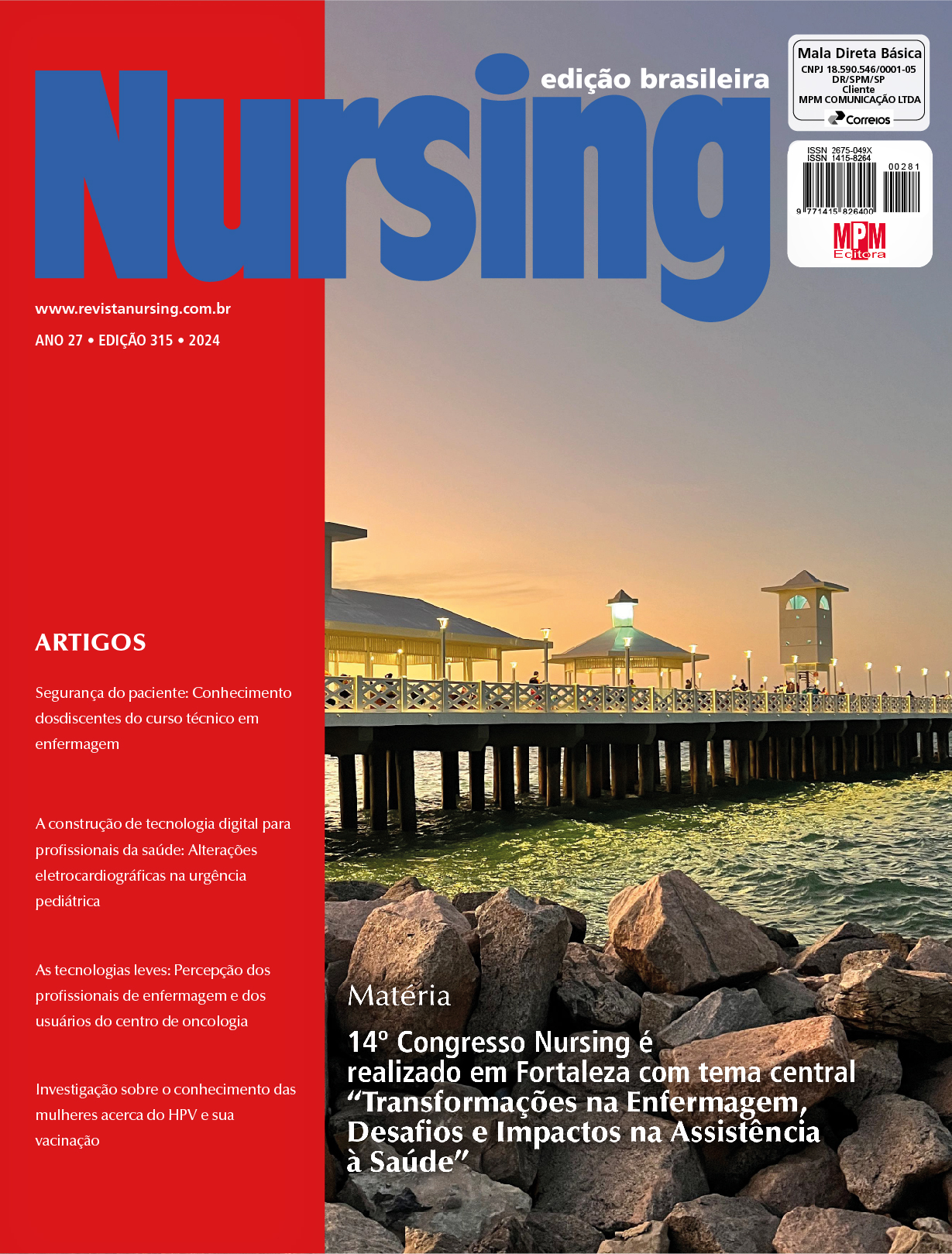INTERACTION IN END-OF-LIFE CARE - A NARRATIVE REVIEW OF THE LITERATURE
DOI:
https://doi.org/10.36489/nursing.2024v28i315p9424-9429Keywords:
Palliative Care; Nursing; Interpersonal Interaction; Communication.Abstract
highly humanized and quality care; to identify the nature of interaction and communication in the provision of highly humanized and quality care. METHOD: Narrative review. RESULTS: The process of interaction between nurse, patient and family is central to end-of-life care. The interactions established are not linear, as they involve several variables. The interactions that are established between nurses, sick people and their families have their own characteristics, as they depend on the characteristics of the context and those involved in the process. The nurse's communication and interpersonal skills are decisive in the course of the interaction. CONCLUSION: Interaction, on which nursing care is based, is an extremely useful therapeutic tool in end-of-life care, where training and research play a key role. It is not possible to measure the quality of both interaction and communication, due to their totally subjective nature.
References
Arias-Casais N, Garralda E, Rhee J, Lima L, Pons J, Clark D, et al. EAPC Atlas of Palliative Care in Europe 2019. Vilvoorde: EAPC Press; 2019. Available from: https://dadun.unav.edu/handle/10171/56787.
Instituto Nacional de Estatística. Envelhecimento da população residente em Portugal e na União Europeia. Lisboa; 2015.
Instituto Nacional de Estatística. Projeções de População Residente 2018-2080. 2020.
Becker C, Wright G, Schmit K. Perceptions of dying well and distressing death by acute care nurses. Applied Nursing Researc. 2017;33:149-54.
Barbosa A, Pina P, Tavares F, Neto I. Manual De Cuidados Paliativos. 3ª ed: Associação para a investigação e desenvolvimento da Faculdade de Medicina da Universidade de Lisboa; 2016.
World Health Organization. QUALITY HEALTH SERVICES AND PALLIATIVE CARE - Practical approaches and resources to support policy, strategy and practice. Geneva2021. Available from: https://www.who.int/publications/i/item/9789240035164.
Worldwide Palliative Care Alliance. Global Atlas of Palliative Care. London2020. Available from: http://www.thewhpca.org/resources/global-atlas-on-end-of-life-care.
Radbruch L, De Lima L, Knaul F, Wenk R, Ali Z, Bhatnaghar S, et al. Redefining Palliative Care-A New Consensus-Based Definition. Journal of Pain and Symptom Management. 2020;60(4):754-64.
World Health Organization. WHO Definition of Palliative Care 2002 [Available from: https://www.who.int/cancer/palliative/definition/en/.
World Health Organization. Health financing for universal coverage: What is universal coverage 2017 [1-3]. Available from: https://www.who.int/health_financing/universal_coverage_definition/en/.
Capelas M, Simões A, Teves C, Durão S, Coelho S, Silva S, et al. Indicadores de qualidade prioritários para os serviços de cuidados paliativos em Portugal. Cadernos de saúde. 2018;10(2):11-24.
Murray S, Kendall M, Mitchell G, Moine S, Amblas-Novellas J, Boyd K. Palliative care from diagnosis to death. The British Medical Journal. 2017;356:j878.
International Association for Hospice & Palliative Care. Consensus-Based Definition of Palliative Care 2019 [Available from: https://hospicecare.com/what-we-do/projects/consensus-based-definition-of-palliative-care/.
Borgstrom E. Advance care planning: between tools and relational end-of-life care? BMJ Supportive & Palliative Care. 2015;5(3):216-7.
Symmons S, Ryan K, Aoun SM, Selman LE, Davies AN, Cornally N, et al. Decision-making in palliative care: patient and family caregiver concordance and discordance-systematic review and narrative synthesis. BMJ Support Palliat Care. 2022.
Payne S. White Paper on improving support for family carers in palliative care: part 1. European Journal of Palliative Care. 2010;17(5):238-51.
Figueiredo M. Modelo dinâmico de avaliação e intervenção familiar-uma abordagem colaborativa em enfermagem de família. 1ª edição ed. Loures: Lusociência; 2012.
Wright L, Leahey M. Enfermeiras e Famílias. Um guia para a avaliação e intervenção na família. 5ª edição ed. São Paulo: Roca; 2009.
Maslow A. Theory of Human Motivation. Psychological Review. 1943. p. 370-96.
Sukhera J. Narrative Reviews: Flexible, Rigorous, and Practical. J Grad Med Educ. 2022;14(4):414-7.
Caswell G, Pollock K, Harwood R, Porock D. Communication between family carers and health professionals about end-of-life care for older people in the acute hospital setting: a qualitative study. BMC Palliative Care. 2015;14(35).
Gomes B, Pinheiro M, Lopes S, Brito M, Sarmento V, Ferreira P, et al. Risk factors for hospital death in conditions needing palliative care: Nationwide population-based death certificate study. Palliat Med. 2018;32(4):891-901.
Feiteira B, Cerqueira M. As Conferências Familiares em Cuidados Paliativos: Contributos para a prática clínica em enfermagem. Mauritius: Novas Edições Acadêmicas; 2018.
Pepin J, Kérouac S, Ducharme F. La Pensée Infirmière. 3rd Edition ed. Montréal Chenelière Education; 2010.
Meleis A. Theoretical Nursing: Development & Progress. Philadelphia: Lippincott; 2012.
Peplau H. Relaciones Interpersonales en Enfermería - um marco de referencia conceptual para la enfermería psicodinâmica. Barcelona: Salvat; 1990.
Lopes M. Relação Enfermeiro-Doente como Intervenção Terapêutica: Reflexão a Partir dos Resultados de um Trabalho de Investigação. Investigação em Saúde Múltiplos Enfoques. Natal: EDUFRN; 2011. p. 20-30.
Kim H. The Nature of Theoretical Thinking in Nursing. 3rd Edition ed. New York: Springer Publishing Company; 2010.
Andrade G, Pedroso V, Weykamp J, Soares L, Siqueira H, Yasin J. Cuidados Paliativos e a Importância da Comunicação entre o Enfermeiro e Paciente, Familiar e Cuidador. Revista de Pesquisa Cuidado é Fundamental Online. 2020;11(3):713-7.
Campos V, Silva J, Silva J. Comunicação em cuidados paliativos: equipe, paciente e família. Revista Bioética. 2019;27(4):711-8.
Gamondi C, Larkin P, Payne S. Core competencies in palliative care: an EAPC White Paper on palliative care education – part 1. European Journal of Palliative Care. 2013;20(2):86-91.
Sapeta P, Lopes M. Cuidar em fim de vida: factores que interferem no processo de interacção enfermeiro doente. Revista Referência. 2007;4(4):35-57.
Frias C. O Processo de Construção de Cuidados Enfermeiro/Pessoa em Fim de Vida: Encontro de Corpos [Doutoramento]. Lisboa: Universidade de Lisboa; 2010.
McCormack B, McCance T. Development of a framework for person-centred nursing. Journal of Advanced Nursing. 2006;56(5):472-9.
Querido A, Salazar H, Neto I. Comunicação. In: Barbosa A, Neto I, editors. Manual de Cuidados Paliativos. 3ª edição ed. Lisboa: Faculdade de Medicina da Universidade de Lisboa - Núcleo de Cuidados Paliativos - Centro de Bioética; 2016. p. 815-32.
Ozcelik H, Cakmak D, Fadiloglu C, Yildirim Y, Uslu R. Determining the satisfaction levels of the family members of patients with advanced-stage cancer. Palliative & Supportive Care. 2015;13(3):741-7.








